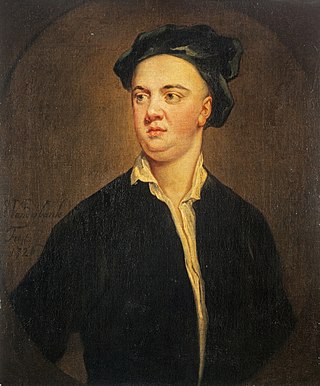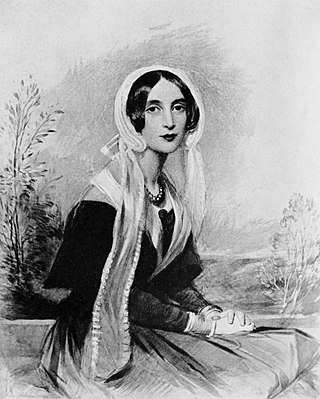
Thomas Penson De Quincey was an English writer, essayist, and literary critic, best known for his Confessions of an English Opium-Eater (1821). Many scholars suggest that in publishing this work De Quincey inaugurated the tradition of addiction literature in the West.

Religio Medici by Sir Thomas Browne is a spiritual testament and early psychological self-portrait. Published in 1642 after an unauthorized version was distributed the previous year, it became a European best-seller which brought its author fame at home and abroad.

James Thomson was a Scottish poet and playwright, known for his poems The Seasons and The Castle of Indolence, and for the lyrics of "Rule, Britannia!"

The "Ode on Indolence" is one of five odes composed by English poet John Keats in the spring of 1819. The others were "Ode on a Grecian Urn", "Ode on Melancholy", "Ode to a Nightingale" and "Ode to Psyche". The poem describes the state of indolence, a word which is synonymous with "avoidance" or "laziness". The work was written during a time when Keats was presumably more than usually occupied with his material prospects. After finishing the spring poems, Keats wrote in June 1819 that its composition brought him more pleasure than anything else he had written that year. Unlike the other odes he wrote that year, "Ode on Indolence" was not published until 1848, 27 years after his death.

Sara Coleridge was an English author and translator. She was the third child and only daughter of the poet Samuel Taylor Coleridge and his wife Sara Fricker.

Les Paradis Artificiels is a book by French poet Charles Baudelaire, first published in 1860, about the state of being under the influence of opium and hashish. Baudelaire describes the effects of the drugs and discusses the way in which they could theoretically aid mankind in reaching an "ideal" world. The text was influenced by Thomas De Quincey's Confessions of an English Opium-Eater and Suspiria de Profundis.

James Clarence Mangan, born James Mangan, was an Irish poet. He freely translated works from German, Turkish, Persian, Arabic, and Irish, with his translations of Goethe gaining special interest. Starting around 1840, and with increasing frequency after the Great Famine began, he wrote patriotic poems, such as A Vision of Connaught in the Thirteenth Century. Mangan was troubled, eccentric, and an alcoholic. He died early from cholera, amid the continuing dire conditions of the Famine. After his death, Mangan was hailed as Ireland's first national poet and admired by writers such as James Joyce and William Butler Yeats.

Childe Harold's Pilgrimage is a long narrative poem in four parts written by Lord Byron. The poem was published between 1812 and 1818. Dedicated to "Ianthe", it describes the travels and reflections of a young man disillusioned with a life of pleasure and revelry and looking for distraction in foreign lands. In a wider sense, it is an expression of the melancholy and disillusionment felt by a generation weary of the wars of the post-Revolutionary and Napoleonic eras. The title comes from the term childe, a medieval title for a young man who was a candidate for knighthood.

Confessions of an English Opium-Eater (1821) is an autobiographical account written by Thomas De Quincey, about his laudanum addiction and its effect on his life. The Confessions was "the first major work De Quincey published and the one that won him fame almost overnight".

Dr. John Armstrong (1709–1779) was a physician, poet, and satirist. He was born at Castleton Manse, the son of Robert Armstrong, minister of Castleton, Roxburghshire, Scotland John studied medicine and gained his MD at the renowned University of Edinburgh before establishing a successful medical practice in London.

Charles Howard, 11th Duke of Norfolk, styled Earl of Surrey from 1777 to 1786, was a British nobleman, peer, and politician. He was the son of Charles Howard, 10th Duke of Norfolk, and Catherine Brockholes. Howard was known for actively participating in the Tory party as part of the support for King George III. He also spent a considerable amount of his money rebuilding and refurbishing Arundel Castle after inheriting his title and lands.

"Ode on Melancholy" is one of five odes composed by English poet John Keats in the spring of 1819, along with "Ode on a Grecian Urn", "Ode to a Nightingale", "Ode on Indolence", and "Ode to Psyche". The narrative of the poem describes the poet's perception of melancholy through a lyric discourse between the poet and the reader, along with the introduction to Ancient Grecian characters and ideals.
Nationality words link to articles with information on the nation's poetry or literature.
Robert J. H. Morrison is a Canadian author, editor, and academic. He is British Academy Global Professor at Bath Spa University and Queen's National Scholar at Queen's University, Kingston, Ontario. A scholar of late eighteenth- and nineteenth-century literature and culture, he is particularly interested in the Regency years (1811–1820), Blackwood's Edinburgh Magazine, Jane Austen, and Thomas De Quincey.

Confessions of an Opium Eater also known as Souls for Sale and Evils of Chinatown is a 1962 American crime film produced and directed by Albert Zugsmith. It is loosely based on the 1821 autobiographical novel Confessions of an English Opium-Eater, written by Thomas De Quincey. After circulating for years as a bootleg, it was released on DVD as part of the Warner Archive Collection in 2012.

Suspiria de profundis is a collection of essays in the form of prose poems by English writer Thomas De Quincey, first published in 1845. An examination of the process of memory as influenced by hallucinogenic drug use, Suspiria has been described as one of the best-known and most distinctive literary works of its era.
Patrick Murdoch was an author, publisher and mathematician, who published a biography of poet James Thomson, and also An account of Sir Isaac Newton's philosophical discoveries by Colin MacLaurin.
Opium and Romanticism are well-connected subjects, as readers of Romantic poetry often come into contact with literary criticisms about the influence of opium on its works. The idea that opium has had a direct effect on works of romantic poetry is still under debate; however, the literary criticism that has emerged throughout the years suggests very compelling ideas about opium and its impact on Romantic texts. Usually these criticisms tend to focus on poets such as Samuel Taylor Coleridge, Thomas De Quincey and George Crabbe.

The Fountain of Indolence is an oil painting by the English artist J. M. W. Turner. First exhibited in 1834, it is now in the collection of the Beaverbrook Art Gallery in Fredericton, New Brunswick, Canada.
"Man Was Made to Mourn: A Dirge" is a dirge of eleven stanzas by the Scots poet Robert Burns, first published in 1784 and included in the first edition of Poems, Chiefly in the Scottish Dialect in 1786. The poem is one of Burns's many early works that criticize class inequalities. It is known for its line protesting "Man's inhumanity to man", which has been widely quoted since its publication.















